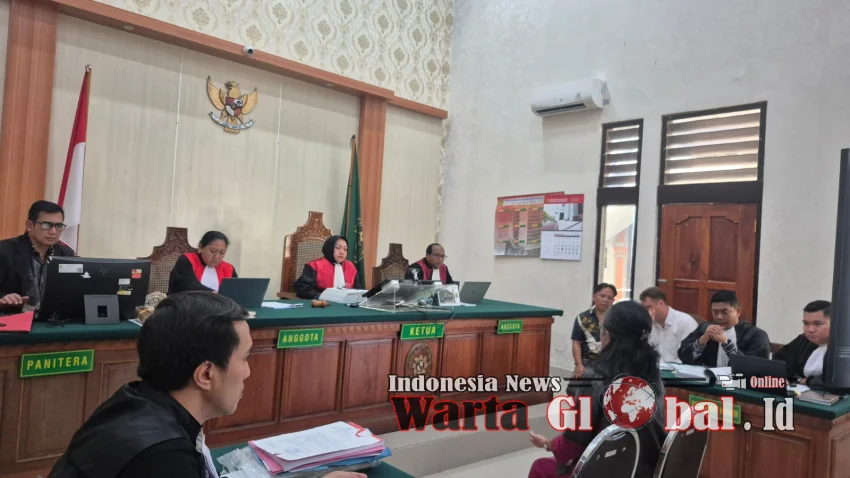
DENPASAR 22/8/2025, WorldWartaGlobal.Id
The drug factory case at Sunny Village Villa in Tibubeneng Village, North Kuta, Badung, is becoming increasingly intriguing. This is after new facts emerged at the trial held at the Denpasar District Court on Thursday afternoon (August 21, 2025). In the trial, held in the Sari Courtroom, defendant Roman Nazarenko denied the prosecutor's accusations that he was the mastermind behind the production of the narcotic mephedrone and the cultivation of hydroponic marijuana.
The Ukrainian man revealed that he was only working on the orders of a man named Oleg Tkachuk. He said that everything he did at the luxury villa was under Oleg's instructions. Roman also confirmed his relationship with the two convicted Ukrainian twins, Mykyta and Ivan Volovod. "Our relationship was just friendship, not drug dealing.
I know they produce narcotics, but I have no business relationship with them (the Ukrainian twins, Ed.)," said Roman.
Facing the defendant's denial, Public Prosecutor Ryan questioned Roman's involvement in Telegram groups called Hydra and Omnic, which discussed narcotics production. Roman remained unmoved and steadfastly denied the allegations. "I know about the Omnic group, but I never provided training in narcotics production," he denied.
Regarding the flow of funds, Roman denied that the money given to the Ukrainian twins came from him. "It's true I gave money (to the Ukrainian twins), but it wasn't my money. It was my boss's, Oleg Tkachuk's. I was simply asked to hand it over," he said.
Roman also admitted to receiving a monthly salary of USD 800 from Oleg. However, he had received a USD 10,000 transfer, citing work insurance.
Meanwhile, the panel of judges was surprised that Roman admitted to renting the villa at Oleg's direction. Regarding this, Roman stated that he was initially only asked to oversee the villa's construction progress. "But, after learning about drug use, I chose to go to Thailand," Roman asserted.
In addition to the defendant, the panel of judges also questioned criminal law expert Maria Silvya E. Wangga. Maria is the Vice Dean III of Trisakti University Indonesia. Interviewed after the trial,
Maria, who also serves as the Head of the Center for Criminal Law Studies, emphasized that the establishment of a Wanted List (DPO) for suspects abroad must refer to the Mutual Legal Assistance (MLA) Law, not just internal police regulations.
According to her, if someone is categorized as a wanted person and is not in Indonesia, the procedure must go through the Minister of Law and Human Rights at the request of the National Police Chief and the Prosecutor's Office, and be submitted diplomatically to the relevant country.
"Why? In the context of investigation, detention, and so on. The regulations are clear because they are public law," Maria asserted. She also added that internal police regulations, such as the Chief of Police Regulation, are insufficient to cover cross-border law enforcement.
"Well, if we look at this internal regulation, it doesn't mention procedures and requirements. So, this National Police Chief regulation is internal in nature, even though we're actually discussing public law enforcement," he said. Maria Silvia highlighted the lack of regulations in the Police Law, which only mentions cross-border cooperation without detailed requirements and procedures. She also noted that the National Police Chief Regulation lacks a detailed explanation of the definition of a wanted person (DPO) or suspect.
"If we want to follow the internal regulation, it must be explicit, explaining who a wanted person is in the Chief Regulation, in Article 1. Usually, when we talk about regulations, (but) it doesn't talk about what a wanted person is," she explained. She further emphasized that the determination of a suspect under the Criminal Procedure Code (KUHAP) must be supported by two valid pieces of evidence.
"What is a suspect? A person who, due to circumstances and actions, based on sufficient preliminary evidence, has committed a crime. Therefore, the preliminary evidence is two pieces of evidence if a person is to be designated a suspect," Maria explained.
In addition to discussing the wanted person, Maria also touched on the authority to confiscate evidence in the Roman Nazarenko case. She emphasized that confiscation must obtain permission from the district court. "Be careful about this. Let's not twist the provisions of criminal procedure law. Because the context of criminal procedure law is very clear that any seizure requires permission from the chief justice of the district court. So, if the seizure has already been carried out and does not receive approval from the chief justice of the district court, the seizure is legally void," he said.
Maria concluded that there are still many shortcomings in Indonesian criminal procedure law (KUHAP). She believes this case is an important note for law enforcement officials, ensuring that cross-border law enforcement regulations are not solely based on internal police regulations but instead refer to public law and higher-level regulations.
Views Post



